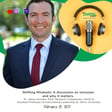
Disability Isn’t the Problem—Trauma Is: Dignity, Disability and Trauma-Informed Practices
Dr. Karyn Harvey Ph.D. and Author of Positive Identity Development
In this powerful episode of The DIVERG. Podcast, we sit down with Dr. Karyn Harvey—a renowned psychologist, author, and leading voice in trauma-informed care for individuals with intellectual and developmental disabilities. With over 35 years of clinical experience, Dr. Harvey has dedicated her career to shifting the way we think about disability, trauma, and healing.
Together, we explore what it really means to center dignity in support systems, why trauma—not disability—is often at the root of challenging behavior, and how practitioners, families, and educators can create environments that foster true connection and emotional safety.
Dr. Harvey’s work challenges us to move beyond behavior-focused interventions and instead focus on identity, community, and the basic human right to a meaningful life. Whether you're a parent, professional, or advocate, this conversation will leave you with a deeper understanding of how trauma-informed, person-centered care can change lives.
Dr Harvey’s Website
The Alliance Against Seclusion & Restraint



















